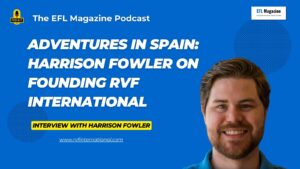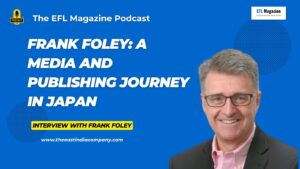by Phil Newman
Ask me about “ELT and the 4th Industrial Revolution” at the bar and I’ll happily oblige. Ask me to present the subject at an IATEFL BESIG conference, I learnt, is a whole different ball game. Presentations are coherently structured, with illustrative power point slides and all is squashed into a tight time-frame like the metaphoric twenty people in a mini. Easier said than done! For this first-timer, it took months of preparation and practice and the result, I admit, was far from perfect. Besides, the whole experience was costly, time-consuming, and stressful. So, why did I do it? Well, there were several reasons:
First, and foremost – I felt the subject needed presenting as it hadn’t been. Not within ELT circles anyway. And not just in terms of new technology. The subject is far more profound than that. So, for once in my professional ELT career, as retirement looms, I stood up and spoke out on issues that are increasingly important for us to consider. The world is changing, as we stand on the brink of the 4th Industrial Revolution’. Technology, environment and social issues are to the forefront.
The ethic of “Conscious Capitalism” and the central tenets of the World
Economic Forum are taking the reins and being practised by modern, forward-thinking companies. And as the tendrils of English language teaching spread throughout global business communities, we ELT professionals are inherently involved. We too need to consider our involvements: What role we play, what values we hold, what discourse we present – through our pedagogy.
Yes, I’ve been blogging on these issues for some time as ‘The Postmodern Guy” but to present on these issues at an international ELT conference and raise their visibilities was a personal mission: An opportunity I felt I could not turn down. So, thanks again to Evan Frendo and IATEFL BESIG for helping me publicly voice these views. Thanks too, to certain persons in the ELT profession for encouraging me to speak out.
Yes, I’m aware that my talk was not standard ELT conference content. It didn’t focus on teaching tips or offer new material for future lessons; although pedagogy was slipped in. But the subject is more philosophical, even political in its consideration of the role and future discourse of ELT. Since ELT and globalization have served each other through the previous three industrial revolutions, how we, as individuals or organizations, act on entering the fourth should be a discursive choice. That’s one message I wanted to get across. And where better to confer on these issues than at a conference?
We EL teachers really do need to be in the loop on all this. Not just on the technology useful for classrooms (VR, AR, smart phone apps. et al), but on the whole gamut of new technologies that our students are innovating
Second – new 4IR technologies are arriving, with increasing rapidity, scope and disruption in all areas from industrial production and logistics, to management and governance. We EL teachers really do need to be in the loop on all this. Not just on the technology useful for classrooms (VR, AR, smart phone apps. et al), but on the whole gamut of new technologies that our students are innovating.These range from bio/nano/neuro/AI technologies to robotics/ internet of things/ block chain technologies. I felt the need to spell this out too. Personally, I have students working in these areas and I imagine you do too. Step out of the classroom and into the world of students to find them.
Third – after nearly twenty years of helping students prepare to give presentations in their own professional lives, I thought I should do the same i.e. give a presentation myself. I wanted to understand what my students go through experientially. To live their stress. To better understand the preparatory process. To find the balance they also strive for (for them, in English no less!) between straight recitations of presentation texts and improvised ad-libbing.
Well, I did it. I gave my presentation in a lecture hall at the University of Cracow (Poland) in front of, perhaps, twenty people. Not quite a Martin Luther King performance but, nonetheless, the experience was genuinely worthwhile and after rushing through my allocated half-hour time slot, I felt drained. So, I disappeared into the city centre to photograph local market stall holders doling out cooked lunch-time dishes. That helped to put my presentation to rest before returning to hear other presenters give their talks. So, what did I learn?
Get the first presentation over and the others will just get better and better”, I have frequently told my students. That much seems to be true and now I can speak from personal experience.
Most importantly, I learnt that I could do it. Yes, I received constructive criticism, for which I am grateful and standing back from the event I can now see numerous ways in which my presentation could be improved: I stuck too much to an over-rehearsed text; I lost time waffling on side issues; I discussed ideas that were, perhaps, over some heads. But the preparatory work got me through this first-time experience, despite the learning curve being steep and arduous. Now, with confidence boosted, I feel I could present on this subject again should such an occasion arise. “Get the first presentation over and the others will just get better and better”, I have frequently told my students. That much seems to be true and now I can speak from personal experience.
In fact, in watching experienced conference presenters, I can see the warm rapport they have with their audience – like they’re chatting with friends at the bar. I put that down to further experience to be gained. At my neophytic stage, now that my presentation text has been learnt, it can be forgotten. I often ask students to put down prepared presentation scripts and ‘just tell me’. The same holds true for me too.
“Know your audience”
I’d been advised beforehand. To be honest, I didn’t, apart from general notions. I mean, ELT conference goers are ELT teachers with interests in ELT. Since the same goes for me, presumably we have a lot in common. No, my ‘difficulty’ was in pitching my talk at an appropriate level. It was rather a content-rich, philosophic subject, deviating from a conference norm of classroom pedagogy. But: “If my talk is above heads”, I’d said to my DoS back in France, “then heads need to be raised”.
Excuse my arrogance – or not.
But I still hold to that and don’t apologize. This is such an important subject, with numerous facets and ramifications, that it needs to be considered in all its depths. I admit that as a first-time presenter, the challenge of presenting the subject clearly, within half-an-hour, was almost beyond me. But at least my personal objective of raising the issue, was achieved.
Furthermore, due to the importance of this subject, I have blogged my presentation on my site: ‘The Postmodern Guy’. Writing here, I aim to raise the issue through the ELT journal. All I’m saying is: ‘Let’s not be caught out playing catch up as the 4th Industrial Revolution steams ahead’. As an oiler of the cogs of international exchange, ELT is a major player. It always has been. We just need to decide which discourse we wish to operate under. That’s an institutional decision, and a personal decision for you to decide.




